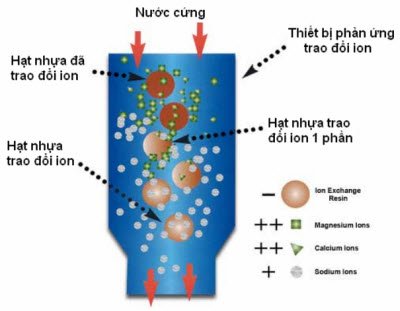Ion exchange resin handle water softening
Introduction to Ion Exchange Resins of cong listen loc nuoc RO
In principle, ion exchange materials are substances not soluble and contain the ions can be easily exchanged with other ions in solution react with it. This Exchange does not alter the physical properties of ion exchange materials. Many natural substances such as protein, cellulose, living cells … capable of ion exchange and this plays an important role in the processes of nature.
Ion exchange resin is a type of polymer is capable of exchanging the specific ion of it with other ions present in the solution flows through the column. Synthetic ion exchange material used is polystyrene plastic with the popular group sulphonate ion exchange likely positive and negative ion exchanger amine group.
Synthetic resins are mainly used to clean glass of water, there are also many other applications including separation and elements in solution.

Ion exchange resin handle water softening
Application in hard water treatment of water production line
The purpose of the ion exchange resin used in drinking water treatment is to soften or remove non-essential minerals in the water. The water is softened by using a resin containing Na + ion is associated with a cation (ion), other cations that are likely associated with Ca2 + and Mg2 + is stronger than Na +. As for the resin into the column and ion exchange for water to flow through the column handler, had plastic in cation will associate with the ions Ca2 + and Mg2 + and keep them in the column, at the same time will free Na + into the water, this helps remove the ion Ca2 + and Mg2 + in drinking water, help more "soft" water.
If water disposal required to remove completely the amount of mineral in water then continue processing by running water through ion exchange columns with plastic contains H + (will eliminate cations) and then through the plastic column contains OH-ions (anions removed). The h + and OH will then combine together to form water (H2O).
(Collection-He thong loc dong nuoc bottle cong nghiep)
